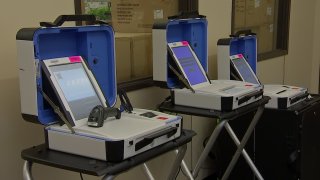
A federal judge on Friday rejected an attempt to force Indiana election officials to allow all voters to cast their ballots by mail because of the coronavirus pandemic.
That ruling came a day after another federal judge struck down Indiana’s process of rejecting absentee ballots because of differing voter signatures, since the process didn’t require voters to be told about such decisions or offer a way to contest them.
The rulings come with elections officials expecting a big jump in voting by mail this fall amid the coronavirus threat.
The group Indiana Vote By Mail and several voters concerned about the risks of COVID-19 exposure at polling stations sued elections officials in April, seeking a court order to extend the no-excuse mail-in balloting that Indiana allowed for the spring primary election to this fall’s general election.
Republican Gov. Eric Holcomb and other GOP leaders have turned aside calls from Democrats and others to lift Indiana’s mail-in voting limits , which only allow people to vote by mail if they fall into one of several categories, including being 65 or older or being absent from their home counties on Election Day.
While most states make the option of mail-in voting widely available, U.S. District Judge James Patrick Hanlon wrote in his decision that state officials had discretion in how to allow mail voting and that voters not wanting to cast ballots on Election Day had the option of going to early voting sites for nearly a month before then.
“While COVID-19 undisputedly presents new and serious challenges, Plaintiffs have not explained why those challenges trigger constitutional protections when the challenges of working mothers, medical personnel, and those working two jobs do not,” wrote Hanlon, who was nominated for his seat on the bench by President Donald Trump.
Local
Hanlon’s decision allows the lawsuit to proceed, but he ruled that those who filed the suit were unlikely to prevail and denied their request for an order that would force the state to allow no-excuse mail-in voting.
Republican state Attorney General Curtis Hill said the decision “helps affirm that Indiana’s election laws are set up to protect voters and ensure the integrity of our political process.”
William Groth, an attorney for the plaintiffs, said he and other lawyers involved were reviewing their legal options.
The other ruling, released Thursday by U.S. District Judge Sarah Evans Barker, prevents election officials from tossing out mailed-in absentee ballots with envelope signatures that don’t match those on voter registration records unless the voters are given enough notice before Election Day.
The lawsuit filed last year by Common Cause Indiana only claims that the problem affected a small percentage of mailed-in ballots in the 2018 election.
Barker, who was nominated for her position by President Ronald Reagan, found that county election workers are not trained in handwriting analysis to determine whether the voter signatures match as required by state law.
The judge faulted the state for disenfranchising voters without any process for notifying them that their mailed-in ballots had been rejected, which would allow them to appeal the decision or cast a ballot in person.
Barker rejected arguments from state attorneys that the signature verification process was a reasonable step to prevent voting fraud.
Julia Vaughn, policy director of Common Cause Indiana, said the ruling would prevent votes from being tossed out because of a flawed law.
“Election laws should protect people’s right to vote and the integrity of our election system,” she said in a statement. “Indiana’s signature matching law failed to do either and wrongly disenfranchised Hoosiers.”
The Indiana attorney general’s office, which represented the state in the lawsuit, was reviewing the ruling and considering its legal options, spokeswoman Melissa Gustafson said Friday.
Common Cause said records it requested from 18 of Indiana’s 92 counties found that eight counties rejected 177 mailed-in ballots during the 2018 general election because of signature mismatches. Only northwestern Indiana’s Lake County, which rejected 32 ballots, had a process for notifying those voters. Ten other counties didn’t reject any such ballots.



